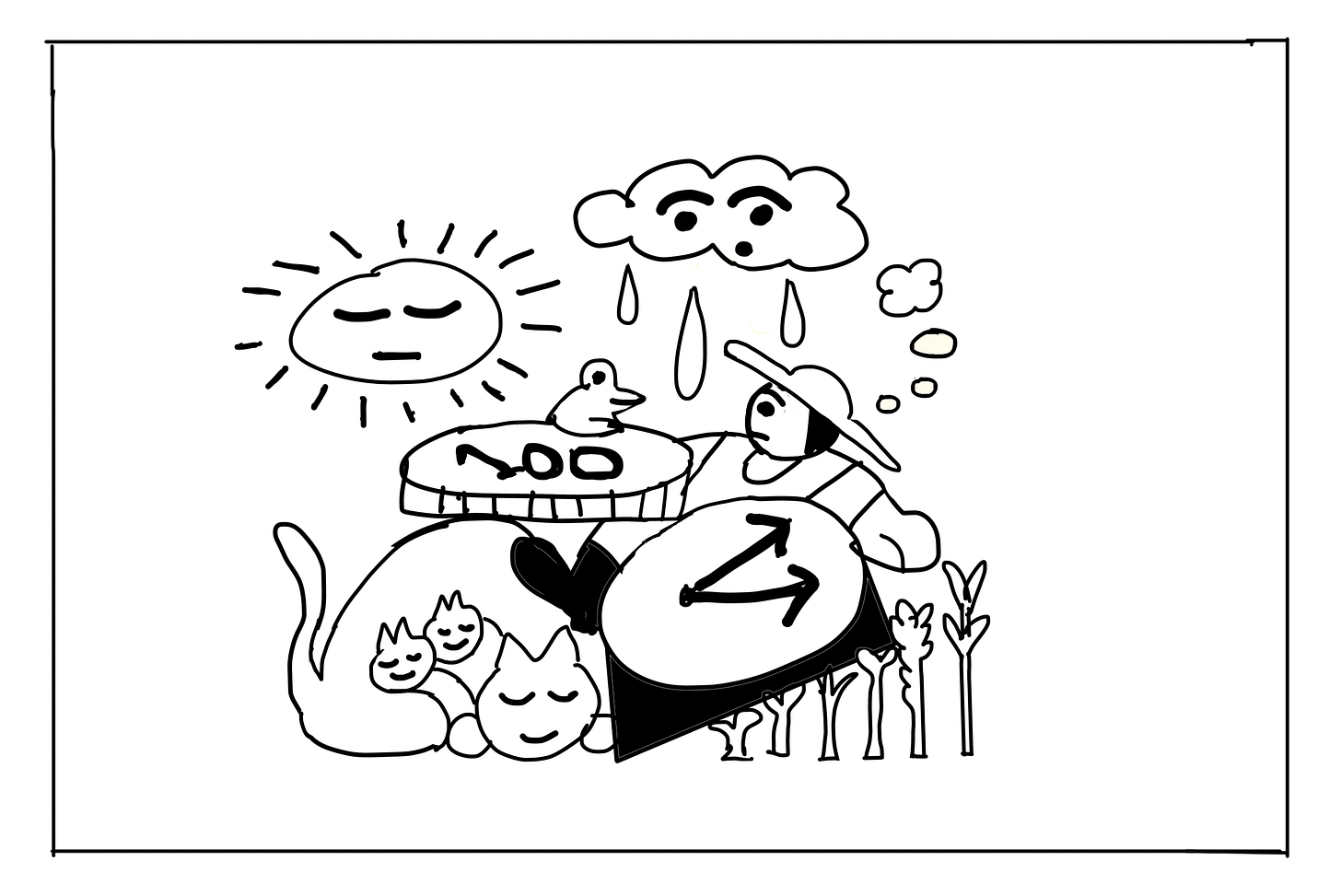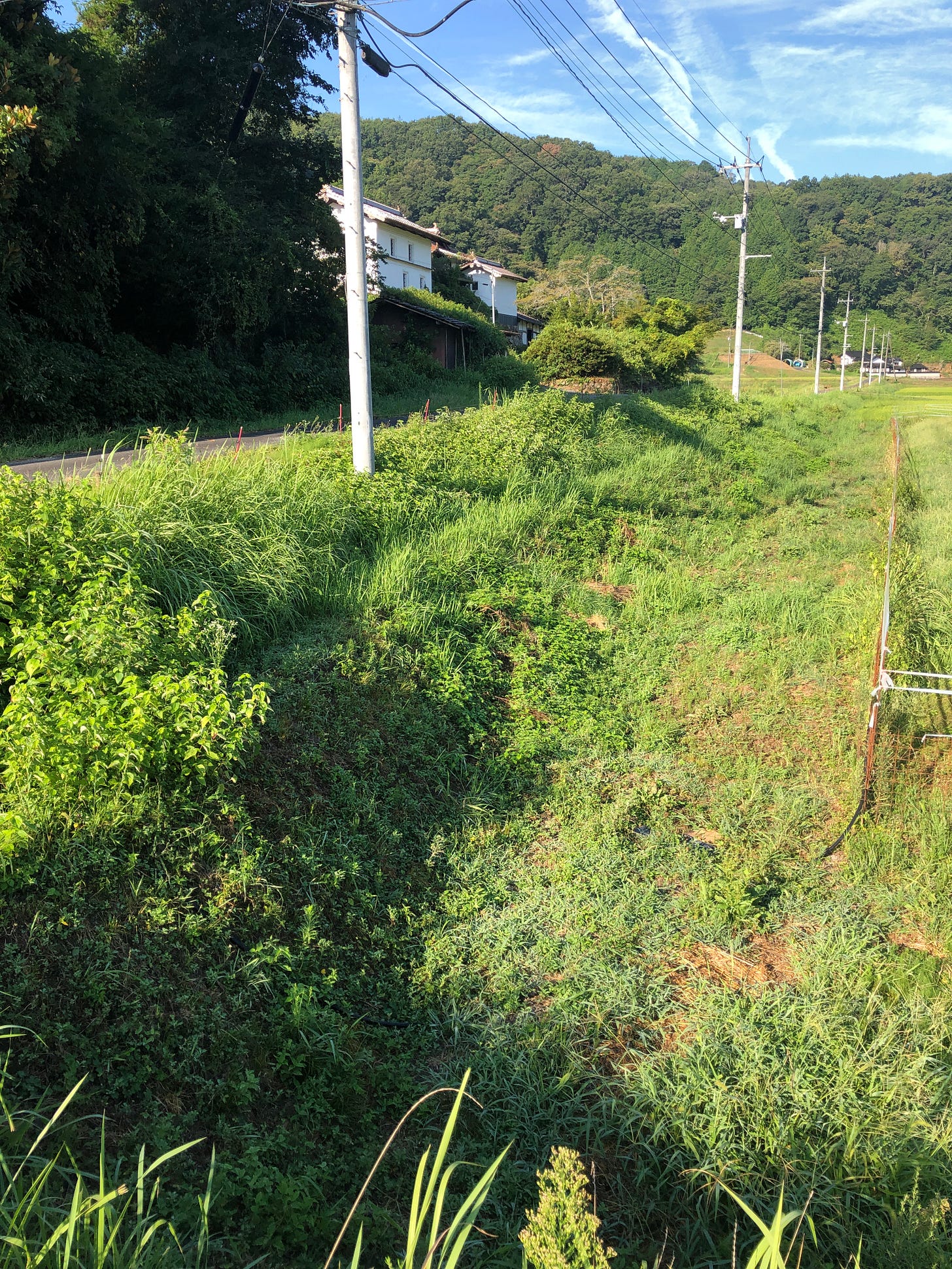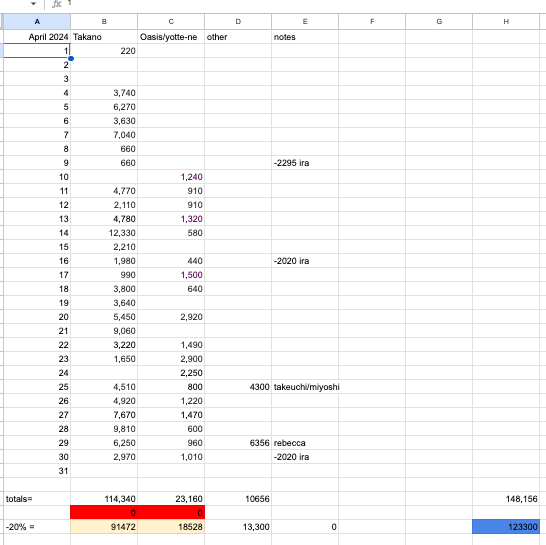Barbarian Farm 3.5 year update… Quitting (kind of)
Why I want to change the farm (and also remember why I wanted to grow food at all).
I find it a bit difficult to write about my struggles at Barbarian Farm because it ends up sounding like a long list of complaints by a lonely, old, bitter farmer. But we’ve recently made the announcement that we are looking for someone(s) to take over the land I’m currently farming on because I want to try and relocate the farm closer to our home and significantly scale down the size. I think it’s fair to want to know why, so I will attempt to explain my reasons below (and keep the complaining to a minimum).
Reason #1: I can no longer physically keep up with the maintenance.
The average age of a Japanese farmer hovers around the late 60’s (apparently the highest in the world). At the time of this writing I’m 31 years old—I should be a “spring chicken” full of endless energy and strength. But the last three and a half years have left me feeling more and more like a broken down old mule. I have had chronic pain for the last two years, and I’m seriously worried about doing permanent damage to my knees and back. I currently don’t have the time to enter a routine of self-care or physical therapy. The endless days of bodily exhaustion are causing mental breakdowns and vice-versa. I can’t seem to break out of this cycle.
I’ve been working on this farm almost entirely by myself for the last three and a half years. Besides the bottomless list of plant care, seeding, harvesting, packing and maintenance that need to be done every single week (work that, by itself is already a lot, physically), the seemingly simple task of grass cutting has become the most grueling and unrewarding job that my body just can’t keep up with.
Barbarian Farm sits on about 4,000 square meters (1 acre) of former rice fields about a 8 minute drive from our home (doesn’t seem like a lot, but it adds up, especially with the constant back and forth for watering). The actual space I’m using to grow the vegetables is significantly less, so the majority of grass cutting is done to maintain the areas around the vegetable beds. It isn’t some nice flat lawn that can be quickly mowed a few times a year either—most of the grass and weeds are on angled slopes which are time consuming, physically draining, dangerous, require certain tools, and generally not pleasurable to do at all.
Perhaps if we owned the land I could consider letting the grass grow to “re-naturalize” the area. If there were no other active rice fields in the area, I wouldn’t have to worry about keeping the irrigation channels clear and grass around the electric fences down to a consistent minimum. But we rent the land and there are neighboring farmers and rice fields to take into account. Letting the grass grow is unfortunately not an option.
One solution is to simply pay for a service to cut the grass a few times throughout the season. Earlier this year we requested two estimates. The first company gave us a quote at ¥70,000, the second at ¥120,000 (each of these prices is for a single cut). Sadly, even with the cheaper option, the price is often more than I can make in a whole month, especially after expenses. At the moment, we simply can’t afford it. Which leads to reason #2…
Reason #2: The farm is not financially sustainable.
I did not become a farmer in order to make money. I knew what I was getting into after working and apprenticing for farmers when I lived in Fukushima. The profit margins for vegetable farmers are incredibly small and the only way to truly generate income (and be eligible for most government support programs) is to scale up, invest in large vinyl houses, and commit to a monoculture crop plan, which is not the type of farming I’m interested in doing.
Being an “anti-capitalist” farmer is also not so easy in practice, at least for those of us who don’t have the luxury of a trust fund, inheritance, or some other financial safety net. I really wanted to see if it was possible to take a small scale vegetable farm approach and make enough money to support our lives in a healthy manner.
Our “cost of living” in the countryside is relatively cheap compared to the cities we both grew up in and around. After rent (for the farm and our home), utilities, insurance, groceries, and various other expenses, our monthly budget needs around ¥200,000 ($1,400 USD) to cover all the costs, not taking into account unforeseen expenses like car/house repairs that inevitably seem to come at the worst times.
On average I’m only able to generate about half of that amount (thankfully my partner is able to make a slightly more steady income) through the sales of our vegetables, and that’s dependent on stable harvests and a full time work schedule (about ¥470/hour). I haven’t been able to find a better option for selling our vegetables and it’s become clear that I can’t keep investing my body into a farm that is costing us money to sustain.
Obviously, having children has been one of the biggest factors that increased our costs. Farmers without families to support can probably figure out how to make a small farm like ours work in the long term, but for us there are lots of unknowns about the future that we feel obligated to plan for... Can we afford to make our house more sustainable? What kind of school options will be available/how much will they cost? How can we save enough for emergencies?
Reason #3: I want more control over my time.
Watching our first child slowly grow over the last three years is truly the most amazing and wonderful thing I’ve ever seen. Coming home and feeling like I can’t muster up the smallest amount of energy to simply play with him has been one of the most devastating revelations in my life. And it is happening consistently, only becoming more frequent as things become additionally busy with a new baby in our lives. Don’t I deserve some time in this short life to spend with our children at this young age? Don’t we both deserve some (at this point I’ll even settle for a tiny) maternal/paternal time off? Doesn’t every single parent deserve this?
I’m more than aware that there are poorer families than us who suffer immeasurably more. There are working class parents in our town that have even longer hours with jobs that I don’t envy at all. This capitalist system was designed precisely so we never have enough time/energy to organize against it or discover other ways of living. I thought independent farming could be a path towards reclaiming some autonomy over my life and time, but I feel myself falling again and again, stuck in the same cycle of anxiety and stress.
I am committed to doing everything within in my power to fight capitalism and take back control over my body and time. To do this, I now understand I need to make the farm smaller and closer to our home, as a start. It needs to be more practical, flexible, and within my capabilities. And I need to remember why growing food is so important to me in the first place.
Reason #4: I don’t know why I’m farming anymore.
I’ve been so focused on trying to keep Barbarian Farm afloat for the last few years that I’ve almost forgotten why I wanted to farm at all. When things are especially bad (like they are this year), I find myself with no motivation to be at the farm or even plan the next season. I've been so worried about making enough money to keep us going that I’ve neglected or pushed back all the questions that truly interested me about growing food: how to feed local communities, how to get food to people who need it the most, how to build peasant power, how to be resilient in the face of our current ecocide.
Where are the majority of my vegetables going? Unfortunately, the answer is middle to upper-middle class customers who want (and are able to afford) organic ingredients when they go shopping. This isn’t the kind of “community feeding” I wanted to do, and it’s sickening that I spend so much of my time worrying about how to sell to and please these customers instead of reaching people who just need food. Mutual aid work and other community-centered projects are what I want to be able to eventually focus on with Barbarian Farm. I won’t be able get there if I’m constantly burning out and stuck in the current system I put myself in—another reason why the farm needs to radically change.
There are incredible challenges in the Japanese countryside when trying to organize anything that remotely “political” or at odds with the status quo. Building or even finding communities in the first place requires so much time and effort, especially for someone like me who isn’t Japanese or totally fluent in the language. But nothing will change if we don’t at least try to make an effort, and this is something I wish to be able to return my attention to.
And so is small-scale vegetable farming actually sustainable?
I used to be more optimistic about this question, but nowadays I’m not so sure. Making enough money to financially support ourselves through the sales of vegetables alone seems pretty much impossible at this point, so I am much more open to doing different kind of work again to generate the income we need, while using the farm more as a place of production to support community projects.
At the same time, learning, failing, experimenting, and finally being able to grow so much of our own food for the last few years feels like an incredibly helpful tool to help deal with the coming climate and social crises that will undoubtedly drastically change all of our lives. I think small farms can and will be a significant part of what can sustain us in the future, but there is a lot of work to be done about sharing knowledge, skills, and experience with young people today. Perhaps this is something Barbarian Farm can be useful for going forward?
Anyway we’re still looking for someone to take over the current farm. If you made it this far and it still sounds appealing, please get in touch.
P.S.
I originally wanted to write more about farming and Palestine, since my experience there was a big motivating factor that made me want to pursue farming in Japan more seriously. Obviously, witnessing the genocide in Palestine and trying to find ways to work towards ending it here in Japan is a big reason why the farm has been so difficult mentally and physically over the last eleven months. But I need the right words. I think I will try to write about this separately, soon.
For now, please check out some of these links:
Yousef Abu Rabee, farmer in Gaza
APNORG, A people's organization seeking to enhance food sovereignty in the Arab world




